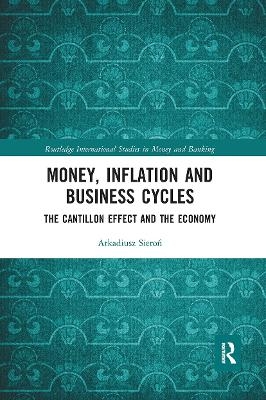
Money, Inflation and Business Cycles
Routledge (Verlag)
978-0-367-66190-8 (ISBN)
- Titel z.Zt. nicht lieferbar
- Versandkostenfrei innerhalb Deutschlands
- Auch auf Rechnung
- Verfügbarkeit in der Filiale vor Ort prüfen
- Artikel merken
Who would disagree that money matters? Economists have yet to sufficiently explore issues related to monetary inflation in relation to the Cantillon effect, i.e. distribution and price effects resulting from uneven changes in the money supply and their impact on the economy.
This book fills this important gap in the existing literature. The author classifies the various channels through which new money can be injected into the economy and demonstrates that it is not only the increase in money supply that is important, but also the way in which it occurs. Since the increase in money supply does not affect the cash balance of all economic entities in the same proportion and at the same time – new money is introduced into the economy through specific channels – a distribution of income and changes in the structure of relative prices and production occur.
The study of money supply growth, carried out in the spirit of Richard Cantillon, offers an important analytical framework that facilitates the development of a number of sub-disciplines within economics and provides a better understanding of many economic processes. It significantly explores the theory of money and inflation, the business cycle and price bubbles, but also the theory of banking and central banking, income distribution, income and wealth inequalities, and the theory of public choice.
This book is therefore an important voice in the fundamental debate on the role of monetary factors in the economy, as well as on the effects and legitimacy of a loose monetary policy. In 2017, the doctoral dissertation on which the book is based was awarded the Polish Prime Minister’s prize. In these times of non-standard monetary policy and rising income inequalities in OECD countries, the focus on the distribution effect of monetary inflation makes this a must read for researchers and policy-makers and for anyone working in monetary economics.
This title was translated from Polish by Martin Turnau.
Arkadiusz Sieroń, PhD, is an assistant professor at the University of Wrocław, Poland. He is a member of the board of the Mises Institute of Economic Education and author of several dozen scientific publications (including in such periodicals as the Quarterly Journal of Austrian Economics and Prague Economic Papers). He received scholarships at The Ludwig von Mises Institute in America (2014 and 2018 Summer Fellowships), won the 2018 Lawrence W. Fertig Prize for the best paper advancing economic science in the Austrian tradition in 2017, and placed third in the 6th International Vernon Smith Prize for the Advancement of Austrian Economics.
LIST OF ILLUSTRATIONS
ACKNOWLEDGMENTS
INTRODUCTION
CHAPTER I – NEUTRALITY OF MONEY
CHAPTER II – THE THEORY OF THE CANTILLION EFFECT
CHAPTER III – THE CANTILLON EFFECT IN THE HISTORY OF ECONOMIC THOUGHT
CHAPTER IV – CLASSIFICATION OF THE CANTILLON EFFECT
CHAPTER V – THE CANTILLON EFFECT AND CREDIT EXPANSION
CHAPTER VI - THE CANTILLON EFFECT AND THE SECONDARY CHARACTERISTICS OF THE BUSINESS CYCLE
CHAPTER VII – THE CANTILLON EFFECT AND PRICE BUBBLES
CHAPTER VIII – THE CANTILLON EFFECT AND INEQUALITIES IN INCOME AND WEALTH
CHAPTER IX – THE INTERNATIONAL CANTILLON EFFECT
SYNOPSIS AND FINAL CONCLUSIONS
APPENDIX
REFERENCES
| Erscheinungsdatum | 01.10.2020 |
|---|---|
| Reihe/Serie | Routledge International Studies in Money and Banking |
| Verlagsort | London |
| Sprache | englisch |
| Maße | 156 x 234 mm |
| Gewicht | 320 g |
| Themenwelt | Geschichte ► Teilgebiete der Geschichte ► Wirtschaftsgeschichte |
| Wirtschaft ► Allgemeines / Lexika | |
| Wirtschaft ► Betriebswirtschaft / Management | |
| Wirtschaft ► Volkswirtschaftslehre ► Finanzwissenschaft | |
| Wirtschaft ► Volkswirtschaftslehre ► Makroökonomie | |
| ISBN-10 | 0-367-66190-X / 036766190X |
| ISBN-13 | 978-0-367-66190-8 / 9780367661908 |
| Zustand | Neuware |
| Informationen gemäß Produktsicherheitsverordnung (GPSR) | |
| Haben Sie eine Frage zum Produkt? |
aus dem Bereich


